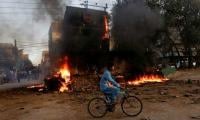ISLAMABAD: While the gas deficit is feared to surge by up to 1.35 billion cubic feet per day in winter, the top man of the government wants smooth supply of gas to domestic consumers with reasonable pressure to avoid any backlash from the masses.
To this effect, the Petroleum Division is set to seek from the Finance Division a huge amount of Rs100 billion for the costly RLNG to be injected into the domestic sector in the winter season 2022-23.
The relevant functionaries are preparing a summary for the Economic Coordination Committee (ECC), a senior official of the Energy Ministry told The News. “The cost of RLNG diverted to the domestic sector in the last four winter seasons stands at Rs108 billion, which is yet to be recovered.”
In the summary, he disclosed, the Petroleum Division would also pitch the proposal, asking the ECC to give a guideline to OGRA to include the RLNG diversion cost in normal revenue requirement of both the gas companies — Sui Northern and Sui Southern.
“Currently, the sale price of natural gas stands at Rs400 per MMBTU whereas the RLNG cost is at $13 per MMBTU (Rs3,100). The Petroleum Division wants the differential to be paid by consumers through the revenue requirements of gas utilities.”
Under the amended act, RLNG is no longer called a petroleum product but has been renamed as gas whose cost can now be recovered from domestic consumers. Since the prime minister wants the authorities to ensure smooth supply of gas to domestic consumers with full pressure in the winter season, it is possible only if the cost of RLNG amounting to Rs100 billion is paid. In case the said amount is not paid, then the gas sector, which is already soaked in the circular debt of Rs1,500 billion, will have another liability of Rs100 billion and this will make the gas sector of the country more unsustainable.
The official also disclosed that the gas load management plan of Sui Northern has been finalised and this time the gas load management has been carved out not in a conventional way but in a more innovative way. This time the plan would be based on media management, rewards-based systems and risk mitigation as well.
The official said that secretary petroleum held a day-long meeting at the SNGPL head office in Lahore and finalized a comprehensive gas load management plan. It has been worked out that the gas deficit would stay at 900-1,000 mmcfd in the SNGPL system that covers Punjab and KPK. The gas availability in the SNGPL system would remain in the range of 1,520 mmcfd (770 mmcfd of local gas plus 750 mmcfd of RLNG) against the demand of 2,100-2,500 mmcfd. The gas consumers in SNGPL stand at 7.5 million (6.5 million in Punjab and 1 million in KPK).
Likewise, the gas availability in the Sui Southern (SSGCL) system would be in the range of 925-1,000 mmcfd against the demand of 1,250-1,500mmcfd.
The gas deficit in the SSGC system has been estimated in the range of 250-350mmcfd. The gas supply will surely be made zero to the CNG, fertilizer, cement, and non-export industries. However, gas supply to captive power plants of export sectors would also be shut down if winter turns more severe. Right now the captive power plants are being provided 50 percent gas supply. However, for processing in the textile sector, the gas of 40-42 mmcfd gas would continue. The government is extending electricity at the rate of Rs19.99 per unit, which is why the government would halt the gas supply to captive power plants. Right now the power sector is currently being provided 165 mmcfd of gas, which would be halved during the peak winter.
Five thousand kilogrammes of hashish, heroin, bhang and ice worth Rs2,634.44 million were destroyed
Programme approved during recent UAE government annual meetings under directives of Emirates Genome Council
Atta Tarar congratulated Pakistan team on winning ODI series against South Africa
PIA spox says airline was working to rejuvenate its aircraft, bringing them back into operational fleet
Authorities confirm driver’s death, saying he “committed suicide while the train was moving”
Murad stresses need to protect country from external conspiracies, in line with Jinnah’s vision







